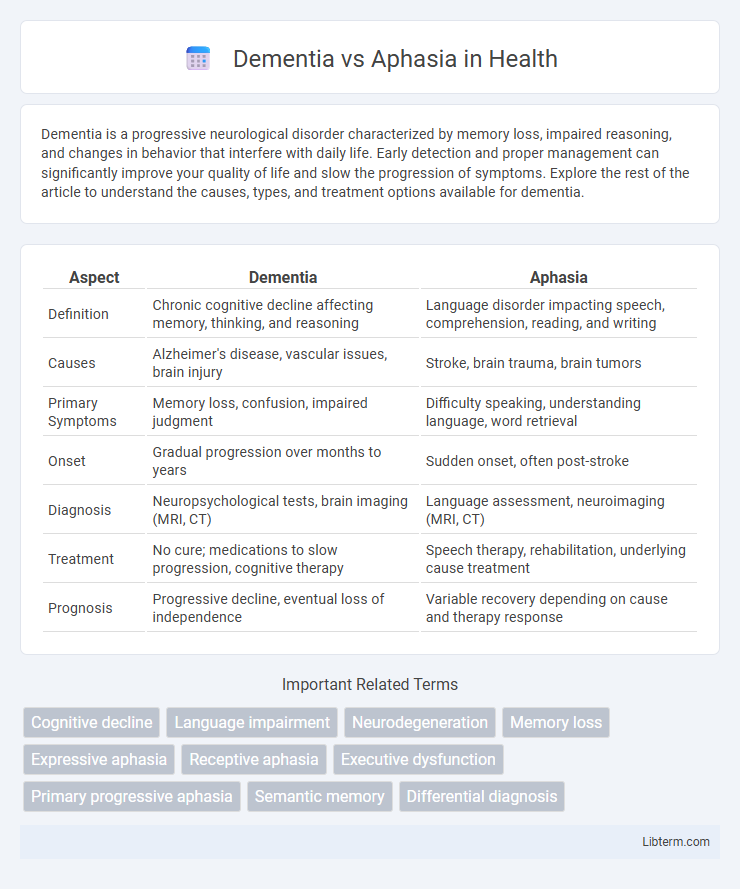Dementia is a progressive neurological disorder characterized by memory loss, impaired reasoning, and changes in behavior that interfere with daily life. Early detection and proper management can significantly improve your quality of life and slow the progression of symptoms. Explore the rest of the article to understand the causes, types, and treatment options available for dementia.
Table of Comparison
| Aspect | Dementia | Aphasia |
|---|---|---|
| Definition | Chronic cognitive decline affecting memory, thinking, and reasoning | Language disorder impacting speech, comprehension, reading, and writing |
| Causes | Alzheimer's disease, vascular issues, brain injury | Stroke, brain trauma, brain tumors |
| Primary Symptoms | Memory loss, confusion, impaired judgment | Difficulty speaking, understanding language, word retrieval |
| Onset | Gradual progression over months to years | Sudden onset, often post-stroke |
| Diagnosis | Neuropsychological tests, brain imaging (MRI, CT) | Language assessment, neuroimaging (MRI, CT) |
| Treatment | No cure; medications to slow progression, cognitive therapy | Speech therapy, rehabilitation, underlying cause treatment |
| Prognosis | Progressive decline, eventual loss of independence | Variable recovery depending on cause and therapy response |
Introduction to Dementia and Aphasia
Dementia is a broad neurodegenerative condition characterized by progressive memory loss, cognitive decline, and impaired reasoning, often linked to diseases like Alzheimer's and vascular dementia. Aphasia specifically refers to a language disorder resulting from brain damage, commonly caused by stroke, which affects speaking, understanding, reading, and writing abilities. While dementia impacts global cognitive functions, aphasia predominantly impairs communication skills without necessarily affecting other cognitive domains.
Defining Dementia: Causes and Symptoms
Dementia is a progressive neurological disorder characterized by a decline in memory, thinking, and reasoning abilities, often caused by Alzheimer's disease, vascular issues, or Lewy body dementia. Symptoms include impaired cognitive functions such as difficulty recalling recent events, confusion, and changes in mood or behavior. Unlike aphasia, which specifically affects language and communication due to brain injury or stroke, dementia encompasses a broader range of cognitive deficits impacting daily living activities.
Understanding Aphasia: Types and Indicators
Aphasia is a language disorder caused by brain damage, affecting speech production, comprehension, reading, and writing, distinct from dementia which primarily impacts memory and cognitive function. Types of aphasia include Broca's aphasia, characterized by non-fluent speech with relatively preserved comprehension, and Wernicke's aphasia, marked by fluent but nonsensical speech and poor comprehension. Key indicators of aphasia involve sudden difficulty in forming sentences, trouble understanding spoken or written language, and challenges in naming objects or repeating phrases.
Key Differences Between Dementia and Aphasia
Dementia is a progressive neurodegenerative disorder characterized by a global decline in cognitive functions, including memory, reasoning, and problem-solving, whereas aphasia specifically impairs language abilities such as speaking, understanding, reading, and writing. Dementia affects multiple cognitive domains with memory loss as a hallmark, while aphasia primarily results from localized brain damage, often due to stroke or injury, leading to selective language deficits. Treatment approaches differ, with dementia requiring management of cognitive decline and behavioral symptoms, and aphasia focusing on speech-language therapy to improve communication skills.
Overlapping Symptoms and Misdiagnosis
Dementia and aphasia share overlapping symptoms such as impaired communication, memory loss, and difficulty understanding language, making accurate diagnosis challenging. Both disorders can cause word-finding difficulties, reduced verbal fluency, and confusion, often leading to misdiagnosis between them. Comprehensive neuropsychological assessments and brain imaging are essential to distinguish between dementia-related cognitive decline and language-specific deficits caused by aphasia.
Diagnostic Tools and Assessment Methods
Dementia diagnosis primarily relies on cognitive screening tests like the Mini-Mental State Examination (MMSE) and the Montreal Cognitive Assessment (MoCA), alongside neuroimaging techniques such as MRI and PET scans to detect brain atrophy and metabolic changes. Aphasia assessment involves language-specific tools like the Boston Diagnostic Aphasia Examination (BDAE) and Western Aphasia Battery (WAB), focusing on speech production, comprehension, repetition, and naming abilities. Both conditions benefit from comprehensive neurological evaluations, but dementia assessments emphasize global cognitive decline, whereas aphasia assessments target language function impairments.
Treatment Strategies for Dementia
Treatment strategies for dementia primarily involve a combination of pharmacological and non-pharmacological approaches aimed at slowing cognitive decline and improving quality of life. Cholinesterase inhibitors such as donepezil and memantine are commonly prescribed to enhance neurotransmitter function, while cognitive rehabilitation, physical exercise, and occupational therapy support maintaining daily functioning. Targeted behavioral interventions and caregiver education also play crucial roles in managing symptoms and reducing caregiver burden in dementia care.
Therapy Approaches for Aphasia
Therapy approaches for aphasia primarily involve speech and language therapy, which targets improving language skills through individualized exercises and communication strategies. Techniques such as constraint-induced language therapy and melodic intonation therapy have shown significant benefits in enhancing verbal abilities and promoting neural plasticity. Unlike dementia treatments that focus broadly on cognitive decline, aphasia therapies are specifically designed to restore language function and facilitate effective communication.
Living with Dementia vs Aphasia: Patient Perspectives
Living with dementia involves progressive memory loss, cognitive decline, and challenges in daily functioning, often leading to gradual personality changes and dependence on caregivers. In contrast, aphasia primarily affects language and communication abilities, with patients maintaining cognitive functions but struggling to express or understand speech. Patient perspectives highlight the emotional impact of isolation in dementia, while aphasia patients emphasize frustration from communication barriers despite preserved awareness.
Prevention, Support, and Resources
Dementia prevention emphasizes a healthy lifestyle, including regular physical exercise, cognitive stimulation, and managing cardiovascular risk factors, while aphasia prevention primarily targets stroke risk reduction through blood pressure control and healthy habits. Support for dementia involves memory care programs, caregiver training, and social engagement, whereas aphasia support often includes speech therapy, communication aids, and specialized language intervention. Resources for both conditions encompass medical professionals, support groups, rehabilitation centers, and online platforms offering educational materials and assistance tailored to individual needs.
Dementia Infographic

 libterm.com
libterm.com